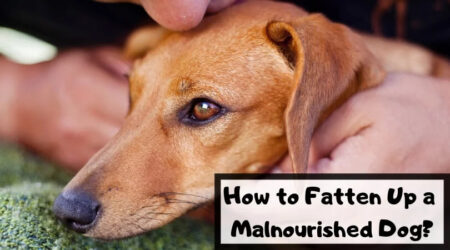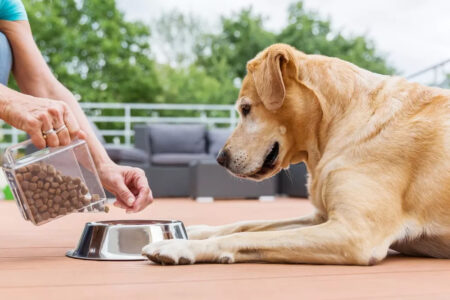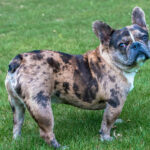If you have a malnourished dog, it is important to take immediate action to help them regain their health and reach a healthy weight. Fattening up a malnourished dog requires a combination of proper nutrition, a regular feeding schedule, and monitoring their progress closely. In this article, we will provide you with tips and guidelines on how to effectively fatten up a malnourished dog, ensuring their well-being and quick recovery.
How to Fatten Up A Malnourished Dog
Here are some steps and guidelines to follow to effectively fatten up a malnourished dog:
- Consult a veterinarian: The first and most important step is to consult a veterinarian to determine the underlying cause of malnourishment and to get professional advice tailored to your dog’s specific needs.
- Start with a balanced diet: Feed your malnourished dog a high-quality, balanced diet that is rich in essential nutrients. Look for dog food that is specifically formulated for weight gain or recovery. You may consider adding supplements like omega-3 fatty acids or vitamin B12 after consulting with your veterinarian.
- Feeding schedule and portion control: Establish a regular feeding schedule for your dog. Split their daily food intake into smaller, frequent meals throughout the day. This will help them digest the food more easily and prevent overeating. Monitor their weight and adjust the portion size accordingly.
- Gradual increase in calories: Gradually increase the caloric intake of your dog’s diet. Start by adding small amounts of high-calorie food or treats to their regular meals. You can use ingredients like cooked chicken, cottage cheese, or canned dog food. Keep in mind to introduce any new food gradually to avoid digestive upset.
- Monitor weight gain: Regular weigh-ins are important to track your dog’s progress. Weigh your dog weekly or as directed by your veterinarian to monitor their weight gain. If you notice that your dog is not gaining weight or is losing weight, consult with your veterinarian for further guidance.
- Limit exercise: While exercise is important for a dog’s overall health, it may need to be limited for a malnourished dog. Consult with your veterinarian about the appropriate level of exercise for your dog during the recovery period. Too much exercise can burn precious calories that are needed for weight gain.
- Patience and consistency: Fattening up a malnourished dog takes time and patience. It’s important to be consistent with their feeding schedule and diet. Stick to the recommended plan and be diligent in monitoring their progress. Remember, healthy weight gain should be gradual and steady.
- Regular veterinary check-ups: Regular check-ups with your veterinarian are crucial during the recovery process. They can assess your dog’s progress, make any necessary adjustments to the diet, and address any other concerns.
What are the Causes of Malnourishment in Dogs?
There can be several reasons why a dog may experience malnourishment:
- Inadequate diet: Feeding a poor-quality or nutritionally imbalanced diet can lead to malnourishment. Dogs require a balanced diet that includes proper amounts of proteins, carbohydrates, fats, vitamins, and minerals. If they are not getting the necessary nutrients from their food, it can result in malnourishment.
- Neglect or abuse: Dogs that have been neglected or abused may not receive proper care, including adequate food and nutrition. This can lead to malnourishment and other health issues.
- Illness or medical conditions: Certain medical conditions, such as digestive disorders, parasites, or infections, can affect a dog’s ability to absorb and utilize nutrients from their food. These conditions can result in malnourishment, even if the dog is being fed an appropriate diet.
- Dental problems: Pain or discomfort in the mouth can make it difficult for a dog to eat properly. They may avoid eating or consuming less food, leading to malnourishment over time.
- Gastrointestinal issues: Dogs with gastrointestinal problems, such as chronic diarrhea or vomiting, can have difficulty absorbing nutrients from their food. This can result in malnourishment as well.
- Stress or emotional factors: Dogs that are experiencing high levels of stress or anxiety may lose their appetite or have decreased interest in eating. This can result in malnourishment if it persists over time.
- Senior dogs or puppies: Senior dogs and puppies have different nutritional needs compared to adult dogs. If their diet is not properly adjusted to meet their specific requirements, they may become malnourished.
Malnourished Dog Symptoms
Here are some common symptoms of malnourishment in dogs:
- Weight loss: One of the most noticeable signs of malnourishment is weight loss. A malnourished dog may appear thin or underweight, with visible ribs, hip bones, and a lack of muscle mass.
- Lack of appetite: Malnourished dogs often have a decreased or complete loss of appetite. They may show little interest in food or refuse to eat altogether.
- Dull and dry coat: A dog that is not receiving proper nutrition may have a dull, dry, and brittle coat. Their fur may lack shine and appear lackluster.
- Lethargy and weakness: Malnourished dogs can be lethargic and lack energy. They may display weakness, reluctance to move, or an overall decreased activity level.
- Digestive issues: Dogs suffering from malnourishment may experience digestive issues such as diarrhea, vomiting, or constipation. These symptoms can further contribute to weight loss and nutrient deficiencies.
- Behavioral changes: Malnourished dogs may exhibit changes in behavior. They may become irritable, anxious, or aggressive. They may also show signs of depression and withdrawal.
- Reduced immune function: Chronic malnutrition weakens the immune system, making malnourished dogs more susceptible to infections and illnesses. They may experience frequent illnesses or have difficulty recovering from existing health problems.
- Poor muscle tone: A lack of proper nutrition can result in muscle wasting and poor muscle tone. Malnourished dogs may have weak muscles and a visibly thin or emaciated appearance.
Human Foods to Fatten Up a Dog
While it’s important to feed your dog a balanced and nutritious diet formulated specifically for them, some human foods can be used in moderation to help fatten up a malnourished dog. Here are a few examples:
- Cooked Chicken: Skinless, boneless, and cooked chicken can be a good protein source for dogs. It can be added to their regular meals or given as a special treat.
- Cottage Cheese: Cottage cheese is a good source of protein and calcium. It can be offered to dogs as a snack or mixed with their regular food to enhance the calorie content.
- Eggs: Cooked eggs are a good source of protein for dogs. It can be scrambled or boiled and added to their meals.
- Peanut Butter: Peanut butter is high in healthy fats and protein. It can be used as a palatable treat or spread on a Kong toy for mental stimulation. Make sure to choose a peanut butter brand that does not contain xylitol, as this can be toxic to dogs.
- Plain Yogurt: Plain yogurt is rich in probiotics and protein. It can be given as a snack or mixed with their regular food.
- Sweet Potatoes: Cooked sweet potatoes are a good source of carbohydrates that can be added to your dog’s diet. They are also rich in fiber, vitamins, and minerals. However, make sure to remove the skin and any seasoning before feeding it to your dog.
- Pumpkin: Canned, unsweetened pumpkin puree can be added to your dog’s meals to help increase their calorie intake. It is also a good source of fiber and can help with digestion.
- Salmon: Cooked salmon is an excellent source of omega-3 fatty acids, which can promote a healthy coat and skin. It can be added to your dog’s diet in small amounts.
SEE ALSO: When to Worry About Your Cat Drinking a Lot of Water
How to Fatten Up a Dog in A Week
Fattening up a dog in just one week may not be realistic or healthy, as healthy weight gain should be gradual and steady. However, there are steps you can take to promote weight gain and support your dog’s overall health over time. Here are some guidelines to help you in the process:
- Consult with a veterinarian: Before making any changes to your dog’s diet or feeding routine, consult with a veterinarian. They can assess your dog’s current condition, provide guidance on a suitable plan, and monitor their progress.
- Adjust their diet: Feed your dog a high-quality dog food that is specifically formulated for weight gain or recovery. You may consider switching to a higher-calorie diet or adding a supplement such as canned dog food or canned pumpkin to increase calorie intake. Ensure that the food is rich in essential nutrients and meets their dietary requirements.
- Increase feeding frequency: Instead of feeding your dog two meals a day, consider splitting their daily portion into smaller, more frequent meals. This can help their body absorb and utilize nutrients more effectively.
- Monitor portion sizes: Pay attention to portion sizes and adjust accordingly based on your dog’s size, activity level, and weight goals. Measure their food accurately to avoid overfeeding or underfeeding.
- Introduce healthy treats and additions: You can add healthy, high-calorie treats or additions to your dog’s regular meals. Options like cooked chicken, cottage cheese, or a small amount of peanut butter can be used in moderation to increase calorie intake.
- Regular exercise: Engage your dog in regular exercise to promote muscle development and overall well-being. Consult your veterinarian for appropriate exercise recommendations based on your dog’s current condition.
- Regular weigh-ins and monitoring: Weigh your dog regularly to track their progress. This will help you determine if they are gaining weight at a healthy pace. If you notice any unexpected weight fluctuations or concerns, consult with your veterinarian.
- Patience and consistency: Remember that healthy weight gain takes time and patience. Stay consistent with the feeding routine, monitor their progress, and make adjustments as needed.
Homemade Food for Dogs to Gain Weight
When it comes to homemade food for dogs to gain weight, it’s essential to ensure that their diet remains balanced and meets their nutritional requirements. Here is a recipe idea that can help promote weight gain in dogs:
Ingredients:
- 1 cup of cooked, boneless chicken or turkey (shredded)
- 1 cup of cooked brown rice or quinoa
- 1/2 cup of cooked sweet potatoes (mashed)
- 1/4 cup of cooked carrots (mashed or finely chopped)
- 1/4 cup of cooked green beans (chopped)
- 1 tablespoon of olive oil or coconut oil
- Optional: a sprinkle of fresh parsley or other dog-safe herbs for flavor
Instructions:
- Cook the chicken or turkey thoroughly, removing any skin, bones, and excess fat. Shred the meat into small, easily digestible pieces.
- Cook the brown rice or quinoa according to the package instructions.
- Cook the sweet potatoes, carrots, and green beans until they are soft and can be easily mashed or chopped.
- In a mixing bowl, combine the shredded chicken or turkey, cooked rice or quinoa, mashed sweet potatoes, chopped carrots, and green beans.
- Drizzle the olive oil or coconut oil over the mixture and stir well to combine.
- Optional: Sprinkle a small amount of fresh parsley or other dog-safe herbs for additional flavor.
- Allow the mixture to cool before serving to your dog.
What Should You Consider Before Putting Your Dog on a New Feeding Schedule to Gain Weight?
Before putting your dog on a new feeding schedule to gain weight, there are several factors to consider. Here are some important considerations:
- Consult with a veterinarian: It is crucial to consult with a veterinarian before making any changes to your dog’s feeding schedule. They can assess your dog’s current condition, guide appropriate weight gain goals, and recommend a feeding plan tailored to your dog’s specific needs.
- Underlying health conditions: Dogs with certain medical conditions may require a different feeding schedule or specific dietary modifications. Your veterinarian should evaluate your dog’s health status to determine if any underlying issues need to be addressed.
- Current weight and body condition: Assess your dog’s current weight and body condition. A veterinarian can help determine if your dog is underweight or if there are other underlying factors contributing to their condition. This information will help establish appropriate weight gain goals and feeding adjustments.
- Caloric needs: Determine your dog’s caloric needs based on their weight, activity level, and desired weight gain goals. Your veterinarian or a qualified canine nutritionist can help calculate the appropriate calorie intake for your dog.
- Feeding frequency and portion control: Decide on the feeding frequency and portion sizes that will best suit your dog’s needs. This may involve splitting their daily food intake into multiple smaller meals throughout the day. Portion control is important to avoid overfeeding or underfeeding your dog.
- Slow and gradual changes: Any changes to your dog’s feeding schedule should be implemented slowly and gradually. Sudden changes can cause digestive upset or other health issues. Start by gradually increasing the portion sizes and adjusting the feeding frequency over several days or weeks.
- Nutritional balance: Ensure that your dog’s diet remains balanced and meets their nutritional needs. A balanced diet should include appropriate amounts of protein, carbohydrates, fats, vitamins, and minerals. Consult with your veterinarian or a canine nutritionist to ensure that your dog’s diet is meeting their specific requirements.
- Regular monitoring: Regularly monitor your dog’s weight and body condition to track their progress. If you notice any unexpected changes or concerns, consult with your veterinarian for further guidance.
SEE ALSO: Can Dogs Eat Chicken Nuggets?
FAQs
Q. How can I help my malnourished dog gain weight?
A. If your dog is malnourished and needs to gain weight, there are a few things you can do to help. First, talk to your veterinarian to determine the best diet for your dog and make sure they are eating enough calories. You may need to increase the amount of food they are eating or switch to a higher-calorie food. You can also add some healthy fats to their diet, such as salmon oil, to help them gain weight. In addition, make sure your dog is getting plenty of exercise to help them build muscle mass. And finally, make sure they have access to clean, fresh water at all times.
Q. What is a home remedy for a malnourished dog?
A. If your dog is malnourished, there are a few home remedies that may be helpful. First, make sure they are getting enough to eat. If your dog is not eating enough, you may need to switch to a higher-calorie food or feed them more frequently. Second, make sure they are getting plenty of water. A dehydrated dog will have a difficult time absorbing nutrients from their food. Third, try adding some nutrient-rich foods to their diet, such as eggs, salmon, or chicken. Finally, make sure they are getting enough exercise. Exercise helps increase appetite and promotes healthy digestion.
Q. Does rice fatten up dogs?
A. Yes, rice can be a good source of calories for dogs and can help them gain weight. However, it is important to make sure that the rice you are feeding your dog is cooked and not raw. Raw rice is difficult for dogs to digest and can cause digestive issues. Cooked rice is a complex carbohydrate that is easily digested and provides a good source of energy for dogs. In addition, rice is a good source of essential nutrients like B vitamins, iron, and zinc. To fatten up your dog with rice, simply add a small amount to their regular food.
Q. How can I add fat to my dog’s diet?
A. If your dog needs to gain weight, adding healthy fats to their diet can be a great way to help them put on some extra pounds. There are a few ways you can do this. First, you can switch to a higher-fat food or add extra fat to your current food. Some healthy fats you can add to your dog’s diet include fish oil, flaxseed oil, and olive oil. These oils are all high in omega-3 fatty acids, which are great for dogs. You can also add egg yolks or plain yogurt to their diet.
Conclusion
Fattening up a malnourished dog requires patience, care, and a tailored approach. It’s crucial to consult with a veterinarian to determine the underlying cause of malnourishment and to create a suitable plan. Providing a balanced and nutritious diet, establishing a regular feeding schedule, and monitoring the dog’s progress are key elements in helping them gain weight and regain their health.


